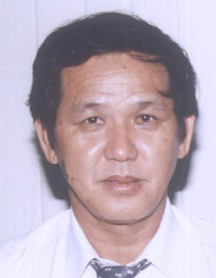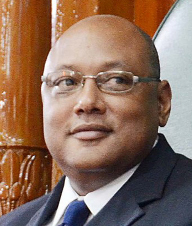In what is likely the final chapter of an intense court battle, acting Chief Justice Ian Chang yesterday found that the parliamentary motion last year by Opposition Leader David Granger to gag Minister of Home Affairs Clement Rohee was “legally misconceived in that such a motion, if passed, could not be implemented by the Assembly without infringing his constitutional rights.”
Justice Chang pointed out that no allegation was made that Rohee as a member of the Assembly has abused any right or privilege of the Assembly or brought it into disrepute or disrespect and as such an attempt to gag him is unconstitutional.

He was at the time ruling in the case that Attorney General Anil Nandlall brought challenging Speaker Raphael Trotman’s decision to limit Rohee’s participation in Parliament until the Privileges Committee of Parliament had ruled on the issue. Nandlall had named Granger and Trotman as respondents.
The only relief the Chief Justice granted in Nandlall’s motion was the declaration that in so far as the National Assembly had prohibited Rohee as a member of the assembly from speaking in the Assembly and presenting bills, motions or petitions for the debate, Trotman “as the representative of the National Assembly has acted unlawfully and unconstitutionally.” He found that Trotman was properly named as a respondent.
According to Justice Chang, much has been said about the omission of Rohee to resign as Minister of Home Affairs following the passing of a no-confidence motion against him in the National Assembly and that such an omission to resign constitutes the breach of convention.
“While it is a matter of extreme doubt whether such a convention exists in Guyana’s system of political government—since Guyana has never legally endorsed the principle of individual ministerial responsibility but rather has constitutionalised the principle of collective ministerial responsibility (Article 106)—it must not be overlooked that a convention is by its very nature unenforceable,” Justice Chang said in the ruling.
He said therefore, the National Assembly could not attempt to enforce the unenforceable by seeking to deny Rohee his right to speak. Further, the acting Chief Justice found that breach of a convention which, by its very nature, is unenforceable cannot attract a “coercive remedial measure- let alone a course of remedial action which involves a breach of the Constitution. A convention is simply unenforceable.”
Justice Chang re-emphasised that Rohee’s right under the Constitution to speak in the National Assembly has nothing to do with his status as a minister as from a legal standpoint he speaks as a member and not the Minister of Home Affairs. He said it may be a matter of expediency or for reason of adherence to a practice of individual ministerial responsibility to the Assembly, he speaks on matters to the Minister of Home Affairs. “But, as a matter of law the exercise of his right to speak in the Assembly or to present any motion, bill or petition for debate is derived from and is in pursuance of his status as a member of the Assembly and not as Minister of Home Affairs,” Justice Chang stated.
The Chief Justice also reiterated that Rohee’s right to speak was not created by the Standing Orders which govern the Assembly as these are procedural rules which do not create substantive legal rights and privileges. “Having been made by the National Assembly itself for the regulation and conduct of its own affairs, they are not law and do not per se have the force of law,” he restated.
Guardian

And in what could be seen as a response to Trotman, who had said Justice Chang’s earlier preliminary ruling on the issue was not binding on him or the National Assembly, Justice Chang yesterday said while it is not the function of the court to intervene in or to interfere with the workings and operations of the National Assembly, the court in accordance with the Constitution and the law has the jurisdiction to determine whether the National Assembly is acting or has acted in contravention of the Constitution or the law of the land.
Trotman had said he would have filed an appeal to the earlier ruling to further clarify the court’s authority over the legislature.
“The court has the jurisdiction to determine the existence and the extent of the rights and privileges of the Assembly and of its members since the determination of such questions involve the determination of issues of law,” Justice Chang said.
However, he said this is not to say that the National Assembly cannot seek to determine such legal issues itself as there is every reason why it should seek to do so. But on the questions of law, it is the determination of the court and not the National Assembly, which is final and binding, the Chief Justice asserted.
“But the court will not inquire into the operations and workings of the Assembly except for the purpose of determining the legal question whether the Assembly has acted or is acting contrary to the Constitution or the law,” Justice Chang ruled.
He noted that since it is not the function of the court to intervene or interfere with the Assembly in the conduct of its affairs or business, the court has no jurisdiction to issue coercive orders to the Assembly.
As such, he said, the order which the court makes whenever it finds the Assembly is acting unconstitutionally or unlawfully, is declaratory and not coercive.
He gave an example. He said that if the National Assembly is debating a bill, it is within the purview of the court to make a declaration that if the bill is passed in its existing form and assented to by the President, it would result in an act which would be void for unconstitutionality.
This declaratory judgment of the court would be final and binding even though unenforceable, the Chief Justice said.
He added, however, that the court could not stop the Assembly from continuing with the bill and it would be only on its passage that it would be open to the court to declare the act void.
The government has argued that several opposition-piloted bills which were passed are unconstitutional and Justice Chang’s ruling yesterday could lead to court moves to challenge them.
This latest ruling by Chang may have finally put a rest to the ‘Rohee saga,’ which began last June when the opposition passed a no-confidence motion against him and later the substantive motion came in the name of Granger which sought to gag the minister.
The ruling may not have been necessary since Speaker Trotman in a surprise turn of events last week came down against the opposition’s moves to gag Rohee in the National Assembly and said that the minister will be allowed to participate fully in parliamentary life.
Earlier, he had said he would have waited until the court ruling before making a decision and when asked about the change he said had continued to do research after the initial ruling and that he was not convinced that the House had the power(s) to pass, and enforce the Resolution proposed in the Motion. “I was convinced in my mind that my original decision was right,” he told Stabroek News last Friday, adding that his research upheld that view.
The rulings by Justice Chang and Trotman came seven months after the opposition embarked on the no-confidence campaign against the minister.
While the AFC has since indicated that it will respect the ruling by Trotman, main opposition APNU has condemned it saying that it is riddled with errors, contradictory and of questionable legal soundness.
“The document is, unfortunately, replete with inaccuracies, of doubtful legal soundness and contradicts the documented positions previously taken by the Speaker,” APNU said in a statement.





